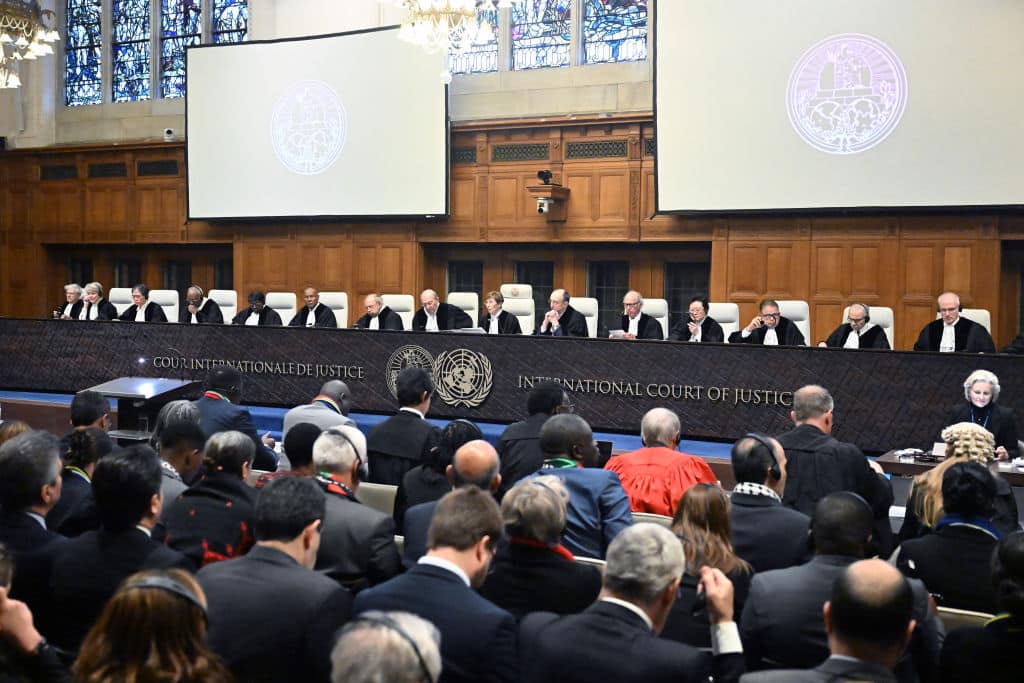Topline:
On Friday, January 12, Israel presented its legal defense at the International Court of Justice (ICJ) at The Hague, Netherlands, responding to a legal claim of genocide leveled at the country by South Africa as a result of its ongoing conflict in Gaza. South Africa brought the charge of genocide to the United Nations’ highest court in late December of 2023, as a result of Israel’s military response to the October 7 Hamas attacks last year. The ongoing conflict in Gaza has so far reportedly left over 23,000 Palestinians dead.
Israel’s Strategy Explained
Israel’s legal team adopted a methodical approach at the ICJ, focusing on legal technicalities and procedural aspects. Rather than engaging deeply with the substantive aspects of South Africa’s allegations, Israel’s representatives highlighted the potential inadequacies of South Africa’s case; highlighting Israel’s right to self-defense in light of the October 7 attacks, emphasizing that the Israeli military has taken extraordinary measures to avoid civilian casualties, and that Israel has attempted to ensure humanitarian aid to civilians in Gaza.
Also key to the arguments Israel’s representatives made is to challenge the jurisdiction of the ICJ, noting that South Africa’s communications before lodging the case with the ICJ did not constitute a formal diplomatic dispute, before escalating the matter to the UN’s highest court.
Key Facts of Israel’s Defense
Loading...
- Israel’s Jurisdiction Challenge: Israel questioned whether the ICJ has the right to hear the case, arguing that there’s no actual legal dispute with South Africa, referencing their communications over the Christmas period.
- Self-Defense Claim: Israel defended its actions as necessary self-defense against Hamas’s attacks on October 7, 2023, denying any acts of genocide against them.
- Humanitarian Aid: Israel countered claims of restricting essential supplies, stating it ensured humanitarian aid reached Gaza.
- Questioning ICJ’s Orders: Christopher Staker, from Israel’s legal team, questioned whether the ICJ can ask a country to stop defending itself.
- Civilian Casualties: Israel blamed the civilian casualties in Gaza on Hamas’ use of civilian areas for military operations.
- Critique of South Africa’s Approach: Malcolm Shaw criticized South Africa for not genuinely seeking to resolve the dispute before approaching the ICJ.
- Debating Genocide Term: Israel’s legal team argued that the term ‘genocide’ does not apply to the situation in Gaza.
Israel’s Representatives’ Quotes
- Shaw, a distinguished British legal scholar specializing in international law, told a packed Peace Palace at The Hague, “South Africa did not give Israel a reasonable opportunity to engage…before filing its no-doubt long-prepared application,” criticizing South Africa’s process.
- Staker, a legal expert with extensive experience in international and public law, posed, “Can provisional measures require a state to refrain from exercising a plausible right to defend itself?” This reflects the complexity of international law in conflict scenarios.
Expanding the Context
Israel’s defense strategy in the ICJ case not only focuses on its right to self-defense but also brings into perspective its longstanding stance in the protracted Israeli-Palestinian conflict. The backdrop of this legal battle is a century-old saga marked by deep historical tensions and a series of conflicts that have shaped the Middle East.
Future of the Case
The ICJ’s decision on South Africa’s provisional measures request could significantly affect the Israeli-Palestinian conflict. Given the complex and detailed nature of ICJ proceedings, which involve extensive written submissions and oral arguments, a final ruling on the genocide allegations might take several years, potentially three to four years. The final decision will occur amidst evolving political and humanitarian contexts in Gaza and Israel, and could have a substantial impact on global diplomatic policies, particularly regarding human rights and international law.
Further Reading
South Africa presents its case at the ICJ over genocide in Gaza (Forbes Africa)
Loading...
